 I know the name Andrew goes back a long way in the Reistetter family. Flipping through large, old books of baptism records in St. Martin Church, the 16th century church, in Lipany, Slovakia I saw the long list of Andrews that led back several generations only to end in an Emericus. I don’t know who chose to first name their baby son Andrew but I am happy to presumably be named after a disciple and an apostle.
I know the name Andrew goes back a long way in the Reistetter family. Flipping through large, old books of baptism records in St. Martin Church, the 16th century church, in Lipany, Slovakia I saw the long list of Andrews that led back several generations only to end in an Emericus. I don’t know who chose to first name their baby son Andrew but I am happy to presumably be named after a disciple and an apostle.
My father Andrew Charles was not completely named after his father Andrew Ambrose since an earlier child was and had died shortly after birth. My parents made me a junior I guess in some ways to follow the family tradition but with a different middle name.
I like the fact that Andrew was the first disciple of Jesus according to the Gospel of John… again the next day John (the Baptist) was standing there, and two of his disciples… Now Andrew, the brother of Simon Peter, was one of the two who had heard John and followed him. He found his first brother Simon and said to him, “We have found the Messias (Christ) and he led him to Jesus.
But having the same name as a disciple doesn’t automatically make me a disciple.
Andrew led to his brother Simon who Jesus renamed Peter and then to Philip who was from the same town and then to Nathanael who questioned, ‘Can anything good come out of Nazareth?’ knowing Jesus was the son of Joseph of Nazareth.
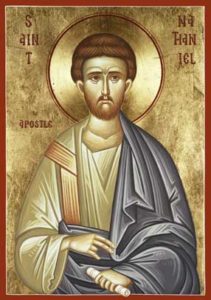 Jesus said of Nathanael: “Behold a true Israelite in whom there is no guile.”
Jesus said of Nathanael: “Behold a true Israelite in whom there is no guile.”
Guile means an insidious cunning in attaining a goal; crafty or artful deception; duplicity.
Maybe God had given Jesus a heads-up on his longstanding dealing with Israelites?
But are we, modern day descendants of somebody from back then, any better?
I learned my ABC’s from the training I received in Corporate America—‘A’ is for Antecedent, ‘B’ is for Behavior, and ‘C’ is for Consequence.
There is always an antecedent before a behavior and a consequence after a behavior. At least in a worldly sense but not always in the new world of love infiltrated by Jesus’ mercy, grace, and compassion.
I look back at times in my life where the ‘A’ lead to the ‘B’ but not the ‘C’. All Glory be to God!
John the Baptist was an antecedent to Jesus Christ.
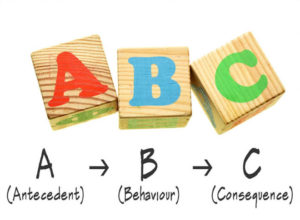 In the beginning was the Word, and the Word was with God; and the Word was God. He was in the beginning with God. All things were made through him… In him was life, and the life was the light of men. And the light shines in the darkness; and the darkness grasped it not.
In the beginning was the Word, and the Word was with God; and the Word was God. He was in the beginning with God. All things were made through him… In him was life, and the life was the light of men. And the light shines in the darkness; and the darkness grasped it not.
There was a man, one sent from God, whose name was John. This man came as a witness, to bear witness concerning the light, that all might believe through him.
And the Word was made flesh, and dwelt among us. And we saw his glory—glory as only-begotten of the Father—full of grace and of truth. John bore witness concerning him, and cried, “This was he of whom I said, ‘He who is to come after me has been set above me, because he was before me.’” And of his fullness, we have all received, grace for grace. For the Law was given through Moses; grace and truth came through Jesus Christ. No one has at any time seen God. The only-begotten Son, who is in the bosom of the Father, he has revealed him.
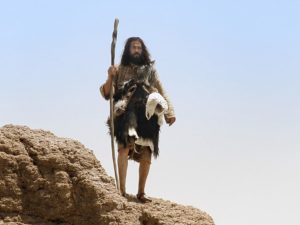 When the Jews sent to John the Baptist from Jerusalem priests and Levites to ask him: “Who art thou?”
When the Jews sent to John the Baptist from Jerusalem priests and Levites to ask him: “Who art thou?”
John’s witness: “I am not the Christ.”
What then art thou Elias? “I am not.”
Art thou the Prophet? “No.”
“Who art thou? That we may give an answer to those who sent us. What hast thou to say of thyself?
John: “I am the voice of one crying in the desert, ‘Make straight the way of the Lord,’ as said Isaias the prophet.”
Why, then, dost thou baptize, if thou art not the Christ, nor Elias, nor the Prophet?
John: “I baptize with water; but in the midst of you there has stood one whom you do not know. He it is who is to come after me, who has been set above me, the strap of whose sandal I am not worthy to loose.”
These things took place at Bethany, beyond the Jordan, where John was baptizing.
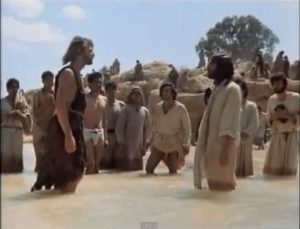 John to Jesus: “Behold, the lamb of God, who takes away the sin of the world! This is he of whom I said, ‘After me there comes one who has been set above me, because he was before me.’ And I did not know him. But that he may be known to Israel, for this reason have I come baptizing with water.”
John to Jesus: “Behold, the lamb of God, who takes away the sin of the world! This is he of whom I said, ‘After me there comes one who has been set above me, because he was before me.’ And I did not know him. But that he may be known to Israel, for this reason have I come baptizing with water.”
John bore witness saying: “I beheld the Spirit descending as a dove from heaven, and it abode upon him. And I did not know him. But he who sent me to baptize with water said to me, ‘He upon whom thou wilt see the Spirit descending, and abiding upon him, he it is who baptizes with the Holy Spirit.’ And I have seen and have borne witness that this is the Son of God.”
What will be the consequence in your life of your baptism in water and The Holy Spirit?
This first of his signs Jesus worked at Cana of Galilee: and he manifested his glory, and his disciples believed in him.
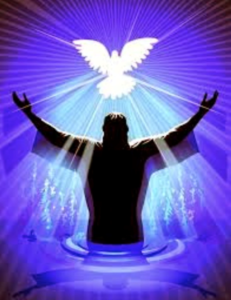 Jesus ministry had begun with a familiar miraculous story of turning water into wine at the marriage feast at Cana. But it wasn’t just wine, it was good wine—“but thou has kept the good wine until now.”
Jesus ministry had begun with a familiar miraculous story of turning water into wine at the marriage feast at Cana. But it wasn’t just wine, it was good wine—“but thou has kept the good wine until now.”
Maybe we are the good wine in life kept towards the end of our life to be more fully shared with the world at a time so determined by God?
Jesus ministry wasn’t only one of miracles but also controversial challenges to the powers-to-be at the time which was the Pharisees and Scribes at the time.
Jesus: “Take these things away, and do not make the house of my Father a house of business.”
And his disciples remembered that it is written, “The zeal for thy house has eaten me up.”
A zeal is a fervor for a person, cause, or object; eager desire or endeavor; enthusiastic diligence; ardor. What are the zeals of your life?
Jews: “What sign dost thou show us, seeing that thou dost these things?”
Jesus: “Destroy this temple, and in three days I will raise it up.”
But he was speaking of the temple of his body.
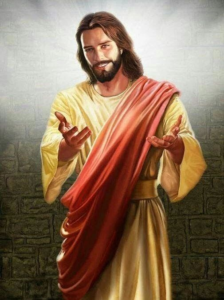 And lastly at the end of Chapter 2 in the Gospel of John:
And lastly at the end of Chapter 2 in the Gospel of John:
But Jesus did not trust himself to them, in that he knew all men, and because he had no need that anyone should bear witness concerning man, for he himself knew what was in man.
Jesus knows us, knows our sins, and still loves us. God offers us salvation—eternal life—through acceptance of His son Jesus and turning from sin to do His Will with our life, powered by God.
It can be so easy yet seems so hard at first glance.
Time to come out of denial, rationalization, and justification?
Still think subconsciously that you can rule the world or even one other person, yet not yourself.
See beyond what seems to be—see destiny, see eternal life!

Day 84: Reading The Bible with a TROML Perspective; Andrew the First Disciple, of John the Baptist, to follow Jesus!
Read and inspired by the New Testament, The Gospel of Saint John Chapters 1-2.
Bible Notes:
The Holy Gospel of Jesus Christ according to Saint John
Saint John, the disciple and Apostle whom Jesus loved, was the brother of James and the son of the fisherman Zebedee and Salome.
First a disciple of John the Baptist, he was called to follow Christ.
The purpose of his Gospel he states as follows: “these are written that you may believe the Jesus is the Christ, the Son of God: and that believing you may have life in his name.”
John Chapter 1: The eternal generation of the world; John the Baptist is His witness; The incarnation; The testimony of John the Baptist; John is asked why he baptizes; “Behold the Lamb of God”; Andrew and John follow Jesus; Andrew calls Peter; Andrew calls Philip; Philip calls Nathanael; Jesus speaks to Nathanael.
In the beginning was the Word, and the Word was with God; and the Word was God. He was in the beginning with God. All things were made through him… In him was life, and the life was the light of men. And the light shines in the darkness; and the darkness grasped it not.
There was a man, one sent from God, whose name was John. This man came as a witness, to bear witness concerning the light, that all might believe through him.
And the Word was made flesh, and dwelt among us. And we saw his glory—glory as only-begotten of the Father—full of grace and of truth. John bore witness concerning him, and cried, “This was he of whom I said, ‘He who is to come after me has been set above me, because he was before me.’” And of his fullness, we have all received, grace for grace. For the Law was given through Moses; grace and truth came through Jesus Christ. No one has at any time seen God. The only-begotten Son, who is in the bosom of the Father, he has revealed him.
When the Jews sent to John the Baptist from Jerusalem priests and Levites to ask him: “Who art thou?”
John’s witness: “I am not the Christ.”
What then art thou Elias? “I am not.”
Art thou the Prophet? “No.”
“Who art thou? That we may give an answer to those who sent us. What hast thou to say of thyself?
John: “I am the voice of one crying in the desert, ‘Make straight the way of the Lord,’ as said Isaias the prophet.”
Why, then, dost thou baptize, if thou art not the Christ, nor Elias, nor the Prophet?
John: “I baptize with water; but in the midst of you there has stood one whom you do not know. He it is who is to come after me, who has been set above me, the strap of whose sandal I am not worthy to loose.”
These things took place at Bethany, beyond the Jordan, where John was baptizing.
John to Jesus: “Behold, the lamb of God, who takes away the sin of the world! This is he of whom I said, ‘After me there comes one who has been set above me, because he was before me.’ And I did not know him. But that he may be known to Israel, for this reason have I come baptizing with water.”
John bore witness saying: “I beheld the Spirit descending as a dove from heaven, and it abode upon him. And I did not know him. But he who sent me to baptize with water said to me, ‘He upon whom thou wilt see the Spirit descending, and abiding upon him, he it is who baptizes with the Holy Spirit.’ And I have seen and have borne witness that this is the Son of God.”
Jesus: “What is it you seek?”
Jesus: “Come and see.”
Andrew to Simon Peter: “We have found the Messeas (which interpreted is Christ).” And he led Simon Peter to Jesus.
Jesus to Simon Peter: “Thou art Simon, the son of John; thou shall be called Cephas (which interpreted is Peter).
Jesus to Philip: “Follow me.”
Philip found Nathanael.
Jesus to Nathanael: “Behold a true Israelite in whom there is no guile.”
Guile—insidious cunning in attaining a goal; crafty or artful deception; duplicity.
Andrew to Peter and Philip, Philip found Nathanael.
Google Search/Wiki: The Gospel of John, unlike the Synoptic Gospels, does not offer a formal list of apostles, but does refer to the Twelve in 6:67, 6:70, and 6:71. The following nine apostles are identified by name: Peter, Andrew (identified as Peter’s brother), the sons of Zebedee (plural form implies at least two apostles), Philip, Nathanael, Thomas (also called Didymus), Judas Iscariot, Judas (not Iscariot). But only seven are named here?
John Chapter 2: The marriage feast at Cana; The miracle discovered; Cleansing of the Temple; The Jews question Jesus.
This first of his signs Jesus worked at Cana of Galilee: and he manifested his glory, and his disciples believed in him.
Jesus: “Take these things away, and do not make the house of my Father a house of business.”
And his disciples remembered that it is written, “The zeal for thy house has eaten me up.”
Zeal—fervor for a person, cause, or object; eager desire or endeavor; enthusiastic diligence; ardor.
Jews: “What sign dost thou show us, seeing that thou dost these things?”
Jesus: “Destroy this temple, and in three days I will raise it up.”
But he was speaking of the temple of his body.
But Jesus did not trust himself to them, in that he knew all men, and because he had no need that anyone should bear witness concerning man, for he himself knew what was in man.

Speak Your Mind